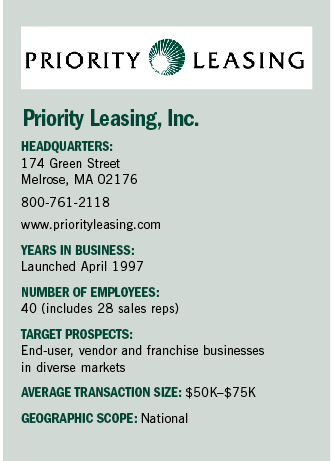 Bob Glendon President & CEO, Priority Leasing
Bob Glendon President & CEO, Priority LeasingPersonalized and attentive service is the characteristic that makes Priority Leasing what it is today. Back in April 1997, when Bob Glendon, president and chief executive officer, was conjuring up a name for his new company, he was sure of one thing: The word “priority” would be part of it.
“I knew the customer was my top priority,” he says, “and that is exactly how we do business. It’s all about giving the customer the financing solution he needs and making that process a smooth experience.”
When Glendon graduated cum laude from the University of New Hampshire in 1991, he knew he had a knack for numbers and a keen interest in business. He nurtured these talents early in his career working as an auditor and CPA. He quickly gained valuable experience in the banking, mortgage and finance industries but was feeling an emotional tug to further define his role in the world of finance. “I really enjoyed the relationship-building aspects of my work, and it was becoming clear to me that I wanted to do something more entrepreneurial,” Glendon explains. “I wanted to start my own business and build it from the ground up.”
He began his search by analyzing different industries, trying to uncover potential opportunities. “I considered starting a mortgage company,” he recalls, “but I came to realize that I was more interested in business-to-business relationships. I chose leasing because there seemed to be fewer barriers than in some other industries.”
Eventually Glendon took the plunge and left his job as a CPA to focus on building contacts. He spent his days making phone calls and mailing literature, getting his name out and building his book of business. As he uncovered end-user business opportunities, he wore all the hats, from sales to credit to funding. “It was definitely on-the-job training,” he laughs. “I learned as I went.”
Today Priority Leasing is a thriving business, with 40 employees working out of offices in Melrose, MA. Inc. magazine has listed the company on its “Inc. 500” twice and, in 2006, named Priority Leasing one of the fastest growing companies in the U.S. based on sales volume. In 2007, the company funded $35 million in business and has set a goal of $45 million for 2008.
The company’s client list now consists of end-users, vendors and franchise businesses. In the early days, Priority Leasing was doing about 98% end-user business but the balance is now closer to 40%, plus 30% vendor and 30% franchise. “All of our sales are done by phone,” says Glendon. “Our customers dictated this, and it is more centralized and efficient for us. We are not adverse to establishing outside sales reps, but we haven’t needed to so far.”
The company has a customized product line, depending on what the customer wants to accomplish. If the customer is doing a build-out or needs to finance soft costs, Priority takes a closer look at the situation. “If the underlying credit supports it, we try to make it work,” he affirms. “We constantly evaluate and re-evaluate our customers and their needs, in order to manage credit and risk.”
Above all, Priority Leasing employees keep in mind that the client is their top priority. This was illustrated during a recent transaction with a customer who wished to acquire a local franchise store. After visiting the Melrose office, meeting people, touring the operation and discussing options, the customer filed an application that day. Due to the transaction size, tax returns were necessary, but Priority made it easy and stopped by the customer’s place of business the next day to get them. The deal was approved within 24 hours.
With financing in place, the lessee was then free to negotiate the purchase of the store and complete the approval process required by the franchising organization. But the customer was so anxious to get moving with his new business, he left for training before returning the signed documents to Priority. This didn’t stop the ball from rolling, however.
Keeping the customer’s needs at the forefront, Priority arranged to pick up the needed paperwork from the customer’s daughter at her workplace. With everything in place, the processing occurred while the owner was still at training. When he returned, the transaction closed, and he was able to take immediate possession of the store.
“The story of Priority Leasing has been a classic tale of how a business grows,” says Glendon. “From start-up to infancy to growth mode, each stage has brought different and unique challenges. At first, it was about finding the cash to meet our payroll and surviving enough to pay our bills. Then it became about hiring good people and getting our name out. As we grow, we experience the normal internal growing pains — making sure we have enough office space, finding the right employees and keeping them.”
The management team has grown with the company; most of its members have been with the company seven years or longer. “People stepped into management jobs as the needs arose,” he continues. “Each member of my team demonstrated the ability to understand what we were trying to accomplish and showed a desire to step into the new role. My managers have a strong desire to see Priority Leasing be successful. They are like part of the family, and they care about the company. The people here have a high level of quality, and our product is the result of the underlying people. Whether it’s management, sales, credit or other tasks — all of our people are first-rate individuals who are here because they want to be.”

As a business owner who started a one-man operation, you might wonder how Glendon’s management skills have kept up with a rapidly growing company. “I have to be honest with myself about what my own strengths and weaknesses are,” confesses Glendon. “It’s important for me to find the right staff to balance out my weaknesses and then not be afraid to empower them or give up control to them. I need to monitor them but not do their jobs. As the company gets bigger and my role becomes more separate from the day-to-day operations, I have to work harder to stay in touch with the business and its employees.
“I try to lead with a management style that maintains the family atmosphere we’ve built. I demand hard work, but I don’t think I am overbearing. I try to talk to everyone, and I let them know where they stand. As the company grows, my position does become necessarily more elevated, so now I sometimes only get involved when there’s a troubled situation. I spend much of my time getting my arms around monthly targets, goals and volume flow. We had a good year in 2007, but we certainly felt the bottom line margin pressures and the squeeze on rates that everyone else experienced. But we managed to grow our business by doing a good job of penetrating new markets, which allowed us to increase sales significantly. We are well postured to take off in 2008.”
While 2008 is certain to produce its challenges, Glendon prefers to look at the opportunities ahead. In a slowed economy, people are less likely to spend cash on equipment and this can open doors to leasing. Some companies will be forced to downsize, leading to increased prospects for companies like Priority Leasing to find and hire good people. Priority’s management team will work to penetrate existing markets further while also examining and evaluating new markets they might enter and laying groundwork for new programs.
“We want Priority Leasing to be known as a company that tells it like it is,” Glendon declares. “We’ll do everything we can to get the deal approved and the vendor paid. We try to prepare so we can keep everyone involved and avoid bottlenecks, and we make good on our promises. We want to be the best company our employees ever worked for. We are still small enough to pay attention to the individual customer, but we are now big enough to be looking ahead to bigger and better things. But we’ll always remember that our watchword is ‘priority,’ and that our customers come first.”
 Lisa A. Miller is a freelance writer who has worked in the equipment financing industry for 12 years.
Lisa A. Miller is a freelance writer who has worked in the equipment financing industry for 12 years.
No tags available